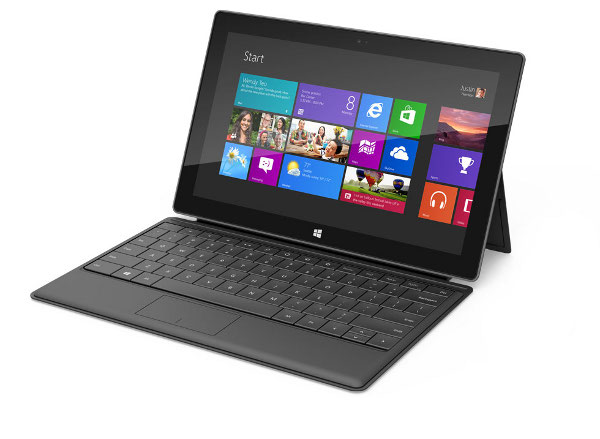Microsoft Surface gets a positive response from this Windows developer

After seeing the latest information about Microsoft's new Surface tablet computers and also reading Joe Wilcox's latest article about them, I finally get Microsoft's mindset -- and I am impressed. So what does this Windows developer think of Surface? Need a tablet to appreciate what it is all about.
I don't have deep pockets, so I try to use my computers as long as possible, but after hearing about Windows 8, I knew I needed to get a tablet as soon as possible. Something big was afoot! Fortunately Microsoft made is easier for me when the Microsoft Store had an amazing deal on an ExoPC Windows tablet for only $399. I jumped on that deal, and I think it was the right one.
When the Windows 8 Developers Preview was available, I quickly downloaded and installed it on a desktop and on my tablet. The tablet produced the better experience, and I appreciated Windows 8 from the start. The ExoPC has the requirements to fully support Windows 8, since unlike some other Windows tablets it has the minimum 1366 x 768 resolution required for the Snap functionality. The tablet also has a 64 gig SSD, so I could partition the drive and install Windows 8 side by side with Windows 7. This allowed me to easily compare the two.
Microsoft has long seen the value of mobile computing, but concepts like Tablet PC just never caught on. This did not mean the concept was wrong, but simply the necessary factors for success just weren't there yet. Apple's iPad really got things rolling and now the hardware for Windows has finally caught up to Microsoft's vision.
Across the Surface
So far I am impressed with what Microsoft promises with their Surface tablets. A couple factors I believe make a difference. First, the built in stand, which appears to be very solid, is a great idea. Second is the unique keyboards. Making them dual-purpose, as a cover for the tablet and keyboard, is a very good idea. Offering two different keyboards, one thin and light-weight for those who don't need to do a lot of heavy typing and the other for those who really need the ability to type as well as they do on their laptop is smart thinking.
I can see how the Windows RT and the Windows 8 Pro versions will likely target different markets. I imagine the RT version will be the less expensive of the two, so it likely will target consumers, while the Windows 8 Pro version will likely be for businesses.
Price is the Big Question
I am not interested in the Windows RT version, since I want a real Windows tablet capable of running current software. My biggest concern though is the price point for the Windows 8 Pro version. There is a lesson to be learned from the netbook, which grew in popularity as much because of price, if not more, than small size and form factor. Whether you are a consumer or a business user, price does make a difference. This can be seen by the success of the Amazon Kindle Fire. Price is the key to its success.
There are plenty of expensive alternatives for those who can afford them, but many people are simply looking for the best mobile experience that is most affordable. The Surface tablets are a great idea, but the price they sell for may be far more important than their specifications. Intel's StudyBook tablet, for example, is a great idea, but unless you can afford to buy them in bulk (like a large school) the price is also likely too high (for individuals). One company sells a version of the StudyBook for about $500, which is way too expensive for my tastes. Price is the main reason I purchased the ExoPC. The features were there, but the price was right.
Surface, Don't stop There
I also would like to see a 7-inch Surface tablet running Windows 8 (not just RT). But to make lower priced tablets a reality, some changes to Windows 8 could help. It is obvious to me as a developer that the Windows 8 Pro Surface tablet will be a bit on the expensive side, because it will have a quad-core CPU. More powerful CPUs not only cost more but they also consume more power.
One of the problems with Windows is how software is developed today. Suffice it to say, that a lot of software is bloated and slow. This is no reflection on the hardware, but how software is written. Herb Sutter in his talk, "Why C++?" discusses how software lacks performance today, and he suggests getting back to writing native code.
As a long-time native code developer myself, I can see the benefits of this. It is possible to write software for Windows that uses minimal resources and which executes very fast. To make lower-cost Surface tablets a reality, getting closer to the operating system makes a lot of sense, since it promotes a more "fast and fluid" experience, while allowing manufacturers to build tablets using less expensive parts.
Businesses want Tablets
Some have suggested that Microsoft is forgoing businesses in favor of consumers, with Windows 8. I have to believe that Microsoft is just as committed to its business customers, so the question arises, are businesses looking for ways to integrate tablets into their companies? Just look at the iPad, for example. There is little doubt that businesses are very interested in the iPad and some are finding ways to integrate them into their operations.
The Surface tablets have the potential for being successful in the workplace, but aside from features, price also may be critical. One of the problems with using any tablet in a business is the cost of developing software for them. If a company has to develop software separately for its desktop computers and its tablet computers, this produces added expense.
This is why the backward compatibility of Windows 8, with previous desktop versions of Windows, is so important. Building Metro apps exclusively may be more expensive, so some software needs to be developed for the desktop but with a more Metro-style so it blends well with Metro, while still being able to run on older computers running Windows Vista or Windows 7.
To be able to build an application that is intuitive, can run full screen and runs just as well on Windows Vista as Windows 8 is a great benefit for companies. This is one reason native coding has some advantages and should be promoted more, rather than less.
Now if businesses, especially the Enterprise, can buy affordable Windows 8 Surface tablets (and even from OEM partners their tablets) and be able to write intuitive software (which can tell whether touch is available) that runs well on legacy desktops, on current desktops and also runs well on a Windows 8 tablet with minimal hardware (so low cost), then Microsoft might see a significantly faster adoption of Windows tablets.
$200 Price Point
Of course many tablets will be in the $500 to $800 range, comparable to many laptops today, but the $200 price point is definitely worth working towards.
Imagine how businesses would jump to buy multitudes of $200 Windows 8 tablets. If a business could buy four $200 tablets instead of just one $800 tablet, likely they would adopt them more quickly. Of course there will also be a market for the more expensive tablets, but a low-cost alternative could make Surface a household name.
Many Form Factors
While I really like the idea of a small mobile computer, I don't think desktops will disappear anytime soon. Even a laptop keyboard can't compare to a quality desktop keyboard (I am still using a 20 year-old IBM Model M keyboard, one of the best ever built). A touchpad just can never replace a mouse for some applications. The ability to be able to easily upgrade a desktop with off-the-shelf parts is a big advantage, especially for a business.
Yet, tablets appear to be here to stay, so software developers need to find ways to be able to build software for both the desktop and tablet worlds. One thing is for sure. Windows has definitely been reimagined! New ways of computing are surfacing and likely more are to come. So far, Microsoft Surface gets a positive response from this Windows developer, but I am still waiting to see how they are priced.
 Chris Boss is an advanced Windows API programmer and developer of 10 year-old EZGUI, which is now version 5. He owns The Computer Workshop, which opened for businesses in the late 1980s. He originally developed custom software for local businesses. Now he develops programming tools for use with the PowerBasic compiler.
Chris Boss is an advanced Windows API programmer and developer of 10 year-old EZGUI, which is now version 5. He owns The Computer Workshop, which opened for businesses in the late 1980s. He originally developed custom software for local businesses. Now he develops programming tools for use with the PowerBasic compiler.
